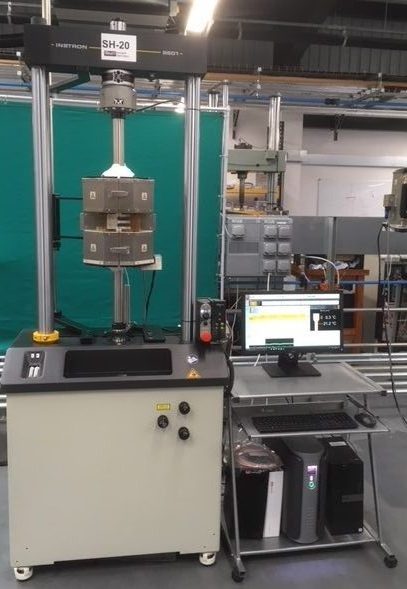1) Load Control
Low cycle fatigue testing under load control involves performing a number of tests across a range of stresses (S) to determine thier number of cycles to fracture (N), allowing the user to generate an S/N curve. This facilitates our customers with the information required to predict behaviour of their materials, which is critical for design, safety and verification purposes.
2) Strain Control
Strain control tests are conducted with an extensometer attached to the specimen gauge section. The feedback from the extensometer is used to control strain cycles until a steady state is achieved, after which the machine is often switched to load control until fracture (where the load values are determined from the final steady state strain loops). Data reported from these tests include (but is not limited to) load peaks, strain peaks and hysteresis loops at specific intervals, calculated plastic, and elastic strain, first cycle information, and half-life cycle loop information.
3) Bending Fatigue
In addition to axial fatigue testing, SMaRT has the capability to perform bending fatigue under 3 or 4 point bend. Large bore furnaces are available to house the test assembly, allowing tests to be conducted at elevated temperature. Tests are performed under load control.
SMaRT routinely conduct low cycle fatigue testing in compliance with the following international and industry standards (working to other standards are available upon request):
- BS 6072 Aerospace series – Metallic materials –Test methods – Constant amplitude fatigue testing
- ISO 1099 Metallic materials – Fatigue testing – Axial force-controlled method
- prEN 3874 Draft European Aerospace Standard – Test methods for metallic materials – Constant amplitude force-controlled low cycle fatigue testing
- BS 7270 Metallic materials. Constant amplitude strain controlled axial fatigue. Method of test
- ISO 12106 Metallic materials – Fatigue testing. Strain control axial fatigue method
- prEN 3988 Draft European Standard – Aerospace series – Test methods for metallic materials – Constant amplitude strain controlled low-cycle fatigue testing
- ASTM E466 Standard practise for conducting force controlled constant amplitude axial fatigue tests of metallic materials
- ASTM E606 Standard Test method for strain-controlled fatigue testing

